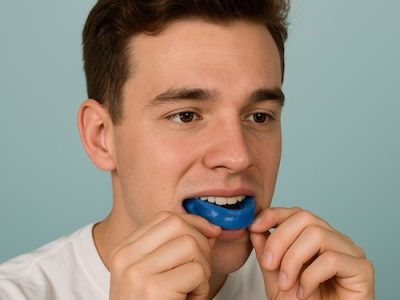Do you have sensitive teeth? Do you find flossing and brushing a little uncomfortable? If there is pain or tingling when you eat ice cream or drink hot coffee or cold water, you most probably have sensitive teeth. It’s believed that tooth sensitivity is most common for people around 25 to 30 years old.
However, you do not have to be in the mentioned age range to experience sensitivity. It can happen to anyone, whether you’re younger or older.
In this blog post, we discuss why some people have sensitive teeth, the leading causes, and what you can do about the problem.
What Does Tooth Sensitivity Mean?
The crowns of your teeth are surrounded by hard enamel, which protects them from damage. There’s a layer of cementum under the gum line whose primary responsibility is to keep the tooth root safe. There’s also gum tissue that serves as a blanket around the tooth root. Under the cementum and hard enamel, dentin is present, which is porous and has plenty of tiny tubules or openings. Inside these microscopic channels lie nerves from the pulp of the tooth. Teeth pulp has blood vessels and nerves located in the centre of the tooth.
This breakdown of the tooth anatomy can be difficult to understand because there are quite a few components involved. However, it’s necessary to learn a little bit about them, which all work together to make sure the teeth and gums stay resilient.
Dentin can lose its protection. And when exposed, it can cause hypersensitivity. This is when you feel discomfort when drinking or eating something hot or cold. When you eat sweet or sour food, you probably complain about the same problem. When you do any of these actions, you feel a sudden, sharp, or shooting pain. That’s because the nerve endings of the teeth get stimulated.
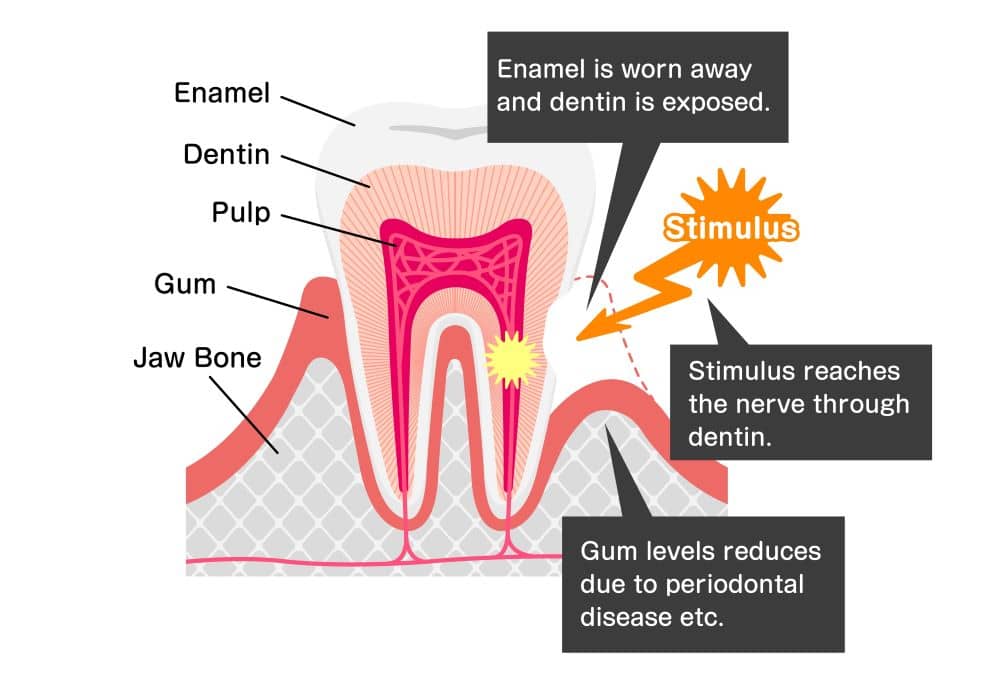
Causes and Signs of Sensitive Teeth
There are many reasons why people suffer from sensitive teeth. It’s important to know what the culprit is so that you can properly address the situation. To find out why you are experiencing tooth sensitivity, please take a look at the list of causes below.
From there, you will figure out the best approach for your case:
Toothbrush
Have you ever wondered why there are soft, medium, or hard bristles? Some people can easily tolerate medium to hard toothbrush bristles. However, if you have sensitive teeth, you should only use soft-bristled brushes. Most dental professionals suggest that it is better to use toothbrushes with softer bristles, even those who do not suffer from teeth sensitivity.
Using stiff bristles and brushing hard could end up damaging your teeth enamel without knowing it. That’s why you should pick a softer brush because it is gentler on the gums.
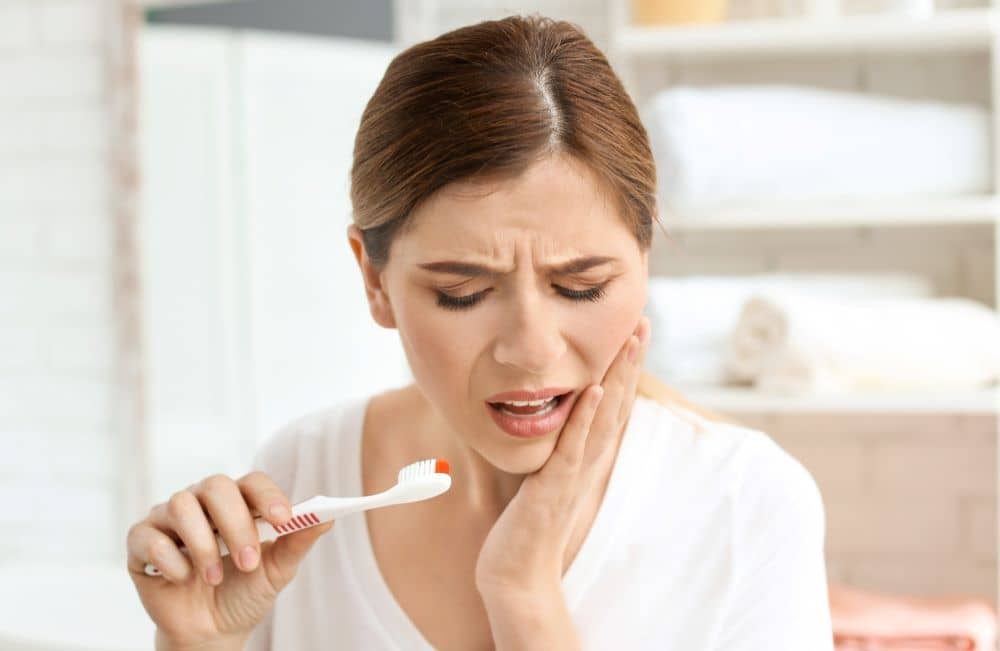
Teeth Whitening
Did you just get a whitening treatment? Isn’t it exciting? You’re probably smiling so confidently because of your pearly whites. But your confidence can become short-lived if you do not follow the guidelines in taking care of your teeth after the procedure. Some people are not ideal candidates for teeth whitening, and you could be among them.
At-home whitening kits are widely available. You can access them at pharmacies. Whitening toothpaste promises to be stronger and better than regular toothpaste with the whitening results. While some may bring positive results, you may be doing more harm than good, especially if you have sensitive teeth.
Whitening your teeth is not a problem. However, suppose you know you’re already suffering from teeth sensitivity. In that case, it’s better to consult with a professional before attempting to DIY whiten at home.
Flossing
Do you floss at least once a day? It should always be a part of your regular oral hygiene routine. With flossing, you stop plaque from accumulating on your teeth. If left untreated, plaque can lead to gum disease. One sign to watch out for is receding gums. If you have sore gums and you see pink in the sink whenever you brush, you may have teeth sensitivity.
About 80% of teeth sensitivity begins at the gum line and not the tooth itself. Therefore, it is only right that you do not neglect the importance of caring for your gums. By regularly flossing, you maintain gum and teeth health, which results in a healthier smile.
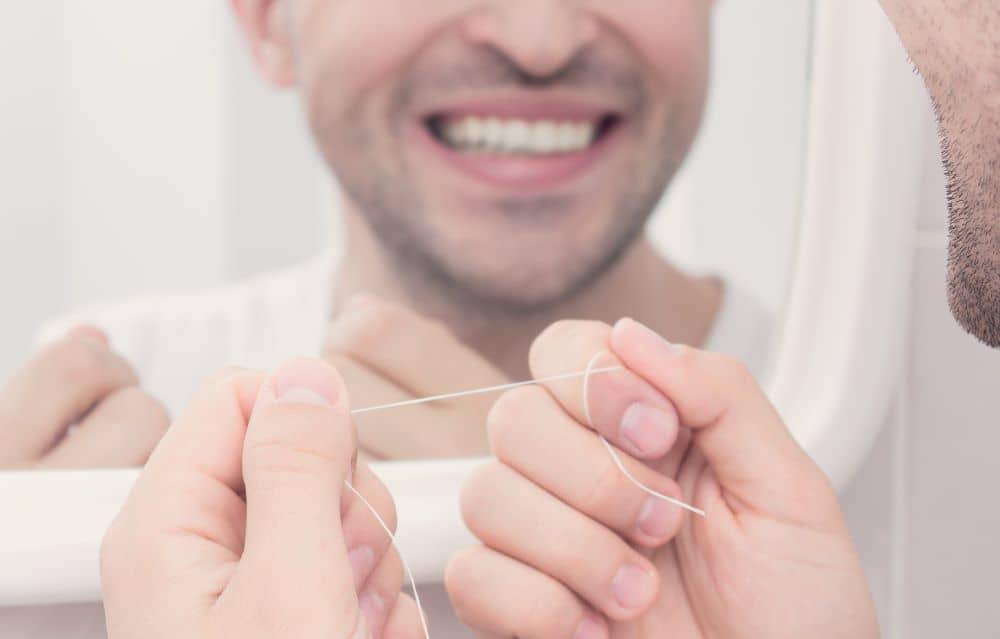
Gum Disease
Were you diagnosed with gum disease? It’s possible that you could develop sensitivity, especially if there is already inflammation in the gum tissue. Most of the time, when the tissue is inflamed, it will not function to protect the roots of your teeth.
When you have gum disease, it means that your gums are not only inflamed but also infected. This infection affects the bone supporting the teeth. If you fail to get it checked and treated by a professional, it could progress. Eventually, it will lead to damaged bone and tissue, both of which are crucial in maintaining the health of your teeth. You will know that the problem has already gotten worse when you see that your gums are receding. It happens when the teeth roots are exposed.
Note, however, that gum recession may be due to your age. In some instances, people with gum diseases do not complain about teeth sensitivity. But if you feel some pain when drinking or eating, you should talk to your dentist right away. Also, ensure that you stop chewing tobacco, which is a huge contributing factor to receding gums.
Tooth Enamel
Your tooth enamel is so strong that it beats the bones when it comes to durability and strength. It is the hardest substance found in your body. However, enamel eventually starts to wear as you get older. However, you could be doing several activities that accelerate its deterioration. For instance, if you keep eating acidic foods and you brush right after, you’re doing more harm than good. Also, overzealous brushing will not remove stains or any other teeth problems.
When your enamel is already damaged, an inner layer of your teeth gets exposed. As a result, you feel sensitivity when you consume anything hot and cold.
Food and Drink Choices
Eating lots of acidic food, especially regularly, causes enamel to erode. When it happens, you feel a little sensitivity, which will then progress if you do not change your habits. Citrus fruits, tomatoes, and pickles are not the only ones that you should watch out for. Tea and coffee are some of the heavily consumed acidic drinks, which can lead to enamel damage.
If you love hard candies, they also contribute to tooth sensitivity. But while citrus fruits and even coffee are acidic, we’re not recommending that you completely get rid of them from your diet. They are nutritious, but you can counteract their effects by eating cheese, bananas, milk, or other foods with low acidic content.

Dental Work
If you have had any dental work done, you can experience a little bit of sensitivity, which should go away after a few weeks. Teeth cleaning, root planing, tooth restoration, and crown placements are among the most common procedures where patients complain about sensitive teeth.
Bruxism
You may not know you are grinding your teeth, but it is one of the biggest culprits of tooth sensitivity. Frequent or habitual grinding damages the outer layer of the enamel of the tooth. It will then lead to the exposure of the inner layer of dentin, which means that you will feel more sensitivity than before.
Does Age Cause Tooth Sensitivity?
Sensitive teeth can happen to anyone, no matter the age of the person. However, the Journal of Conservative Dentistry states that individuals ranging from 20 to 50 years old have a higher chance of having this dental issue. According to the research, the peak of hypersensitivity happens when a person is between 30 and 40 years old.
The exact reason is unknown, though. However, researchers believe that it may be due to the changes in the physical structure of the tooth that comes with ageing. Additionally, older people have a high possibility of having receding gums, which is among the main causes of sensitive teeth. In other cases, it is because of wear and tear occurring on the tooth enamel, which happens as we grow old.
Is It Tooth Sensitivity or Cavities?
Cavities can often make you feel that your teeth are sensitive to hot or cold food and drink. It is often hard to tell whether the cause of the sensitivity is cavities or dentin exposure. The treatment for cavities is not the same as tooth sensitivity, which is why it makes sense to know which problem you have.
You can go to the dentist to know more about your situation.
But while you’re at home, you can check if the pain is due to cavities by looking for the following signs:
- Black spots on the teeth
- Pain that hits you even if you’re not eating or drinking hot or cold
- Incorrectly shaped tooth
- Rough edges of the teeth
Cavities form due to a lack of good oral hygiene. You will need treatment at Chelmsford Dental to make sure that the cavities do not get severe; otherwise, you could end up with more than just a filling, usually a root canal or crown.
On the other hand, teeth sensitivity can be treated in different ways, depending on the extent and cause of the problem.
Home Remedies You Can Try for Sensitive Teeth
Here are some ways that may help alleviate your tooth sensitivity:
- Don’t brush too hard. When you use a heavy hand while brushing, you’re doing more damage. You’re not just taking away plaque but also the protective layer of your teeth. Make sure you use a soft-bristled brush and avoid brushing side to side. Rather, work at a 45-degree angle to keep your teeth clean and your enamel healthy.
- Snack smart. Avoid sugar, high-sugar carbohydrates, and sticky candy. Instead, eat fibre-rich vegetables and fruits, cheese, and yoghurt.
- Use a desensitiser. A desensitising toothpaste is one of the most common treatments that you can try at home. These products are those that are specially made for sensitive teeth. The toothpaste works by blocking pain due to sensitivity. You may have to use it several times to feel the effects.
- Unclench your teeth and de-stress. Being under constant stress is one of the top reasons for teeth grinding. If you cannot control your clenching habit, get a split or mouth guard from Chelmsford Dental.
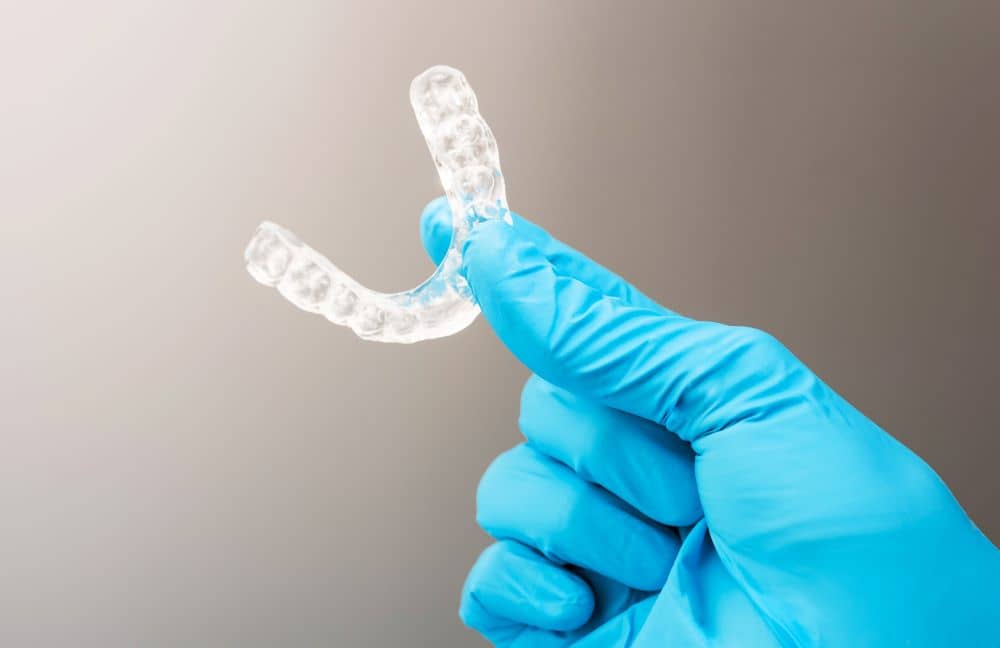
Having good oral hygiene can also help with your teeth sensitivity. However, there are a lot of times when home remedies are not enough. You need a dental professional who will provide suitable treatment.
Going to the Dentist for Help
Experts suggest that you talk to your dentist if you feel pain or sensitivity for more than 30 seconds after coming in contact with cold or hot food. If the tooth pain is severe, you should certainly book an appointment. Your dentist will tell you that you have dentin hyper hypersensitivity or root sensitivity. It means that you do have sensitive teeth. The treatment will depend on the underlying problem.
For some cases, patients require a crown placement, bonding, or inlay to fix a fractured or decaying tooth. Here at Chelmsford Dental, we may also apply a fluoride gel, which will help strengthen your enamel and reduce pain signals that your brain receives. A root canal procedure may also be necessary, which will help remove inflamed or infected tooth pulp.
The good news with tooth sensitivity is that the condition is highly treatable. You need to continue taking care of your dental health by practising good oral hygiene. That way, pain and discomfort due to sensitivity will never return.



